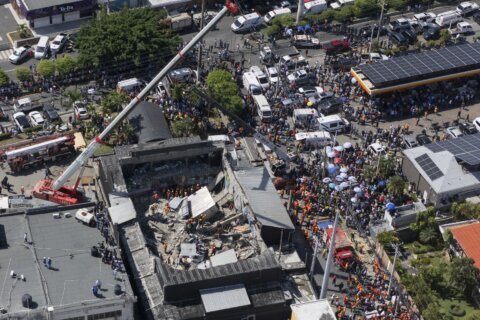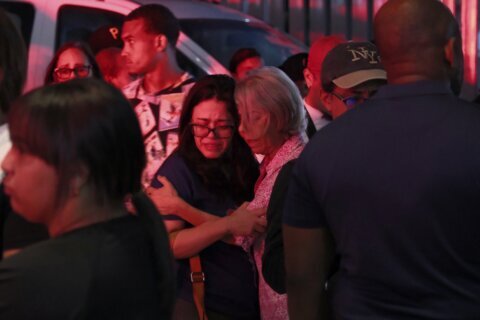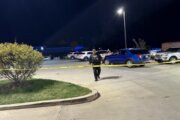TEL AVIV, Israel (AP) — Yaniv Zohar, a former Associated Press videojournalist and beloved colleague who covered conflicts and major news in his native country for three decades, was killed in his home during Hamas’ bloody cross-border rampage on Oct. 7 along with his wife and two daughters. He was 54.
Zohar worked for the AP’s Israel bureau for 15 years, from 2005 to 2020, covering all the major news events in the country. But his area of expertise was the intermittent warfare on the doorstep of his home in the Nahal Oz kibbutz near the border with the Gaza Strip.
Zohar was often the first to alert the news desk of violence nearby and the first to arrive on the scene.
Most notably, he was deeply involved in coverage of the Israeli withdrawal from Gaza in 2005 and was the first newsperson on the scene of the abduction of Israeli soldier Gilad Schalit by Palestinian militants the following year.
“Yaniv was AP’s eyes and ears in southern Israel, always among the first to respond to news in the busy region,” AP Executive Editor Julie Pace said. “He was a part of the community where he worked, giving him insights that were invaluable to his colleagues. When tensions rose in the Middle East, colleagues would quickly ask, ‘What does Yaniv say?’”
In recent years, Zohar worked as a photographer for the Israel Hayom daily newspaper.
“He was a wonderful friend, a devoted father, a man with heart and generosity,” the paper eulogized him in a statement. “He would always run after the next frame despite the difficult sights he was photographing.”
He found his death in perhaps the most devastating sight of them all, as at least 2,000 Hamas militants infiltrated from Gaza and in gruesome fashion killed more than 1,400 Israelis in the deadliest attack in the country’s 75-year history.
Zohar and his family were on the frontline of the massacre in their border kibbutz. He was killed along with his wife, Yasmin, 49, and his two daughters, Tehelet, 20, and Keshet, 18. Zohar’s 13-year-old son Ariel, who had gone for an early-morning jog, escaped alive.
Yasmin’s father, Haim Livne, was also killed in the attack.
Zohar was a gentle giant, standing over 1.9 meters tall (6 feet, 3 inches). Yet his many friends described him as modest, calm, quiet and generous. Though fiercely competitive, he was beloved by his fellow journalists who covered the region, and his home near the Gaza border became a base for other reporters arriving to report breaking news.
“His heart was as big as his body,” said photographer Yehuda Peretz, his close friend.
An estimated 1,000 people attended Zohar ‘s funeral Tuesday in central Israel, where the service was interrupted four times by air-raid sirens and incoming rocket fire from Gaza. Israel’s Iron Dome defense system could be seen interrupting rockets in the sky above.
According to Jewish tradition, burials take place as soon as possible. But it took 10 days before Zohar and his family could be laid to rest because of a backlog due to the sheer numbers of victims and because of the lengthy DNA process required to identify all the bodies.
Zohar’s sister Sivan said the repeated air-raid sirens prevented mourners from completing their eulogies.
“They won’t even let us bury our dead,” she said, her voice shaking. “They broke into their home and murdered all these good, innocent people in cold blood.”
For her father, an 89-year-old Holocaust survivor, she said the experience was like a “second Holocaust.”
She said Zohar’s son would be raised by her sister and that the family planned to go ahead with his bar mitzvah ceremony in a month. “We will continue to celebrate life, and we won’t let anyone destroy us. This is how we will avenge their deaths,” she said.
Sivan described her brother as a devoted journalist whose images of the region reached across the world, and as a man of peace who believed in coexistence.
Veteran AP videojournalist Alon Bernstein recalled his many visits to Zohar’s home, and how they liked to share a bottle of Jack Daniels together.
“Yaniv was a good friend and a real pro. We worked together overseas and all over the country, covering violence wherever it erupted,” Bernstein said. “I have witnessed many atrocities in my long time as a news cameraman. None of them were as horrible as what happened to Yaniv and his family. It is too terrible for words.”
Copyright © 2025 The Associated Press. All rights reserved. This material may not be published, broadcast, written or redistributed.








